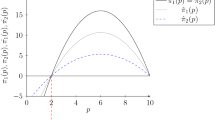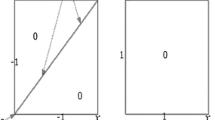Abstract
We provide a generalization of the Gale–Nikaido–Debreu’s lemma for discontinuous excess demand in the light of recent work on the existence of equilibria in games with discontinuous payoffs. The standard upper hemicontinuity property of the excess demand is replaced by the weaker concept of “continuous inclusion property” introduced by He and Yannelis (J Math Anal Appl 450(2):1421–1433, 2017) and we allow for the cone P of admissible prices to be general enough to cover cases for which commodities cannot be freely disposed of.
Similar content being viewed by others
Notes
Assume, for example, that the total production set \(Y \subseteq {\mathbb {R}}^\ell \) satisfies the free disposal assumption \(Y - P^0 \subseteq Y\), for some closed convex cone \(P\subseteq {\mathbb {R}}^\ell \); then profit maximization leads to prices belonging to the given cone P.
When P is degenerate, that is, \(P=\{0\}\), then \(\mathrm{co}\,[P\cap S ]=\emptyset \) and the result cannot hold.
Take \(P={\mathbb {R}}^\ell \) and consider the (single-valued) correspondence \(Z:B\rightarrow {\mathbb {R}}^\ell \) defined by \(Z(p):=\{-p\}\). Then \(\emptyset \ne Z(p^*) \cap P^0 \) if and only if \(p^*=0\), which is the unique equilibrium point of Z in the unit ball \(B= \mathrm{co}\,[P\cap S ]\).
The first idea to get a global selection is to define \({\bar{Z}}\) as follows: \({\bar{Z}}(p) := \cup _{\{i\in I: p\in O_i\}}Z_i(p)\). However, the correspondence \({\bar{Z}}\) may not be upper hemicontinuous.
Note that this step is not needed in the proof of Theorem 2, which only needs to consider Step 2 with Z satisfying the Strong Walras’ law.
References
Aliprantis, C.D., Brown, D.J.: Equilibria in markets with a Riesz space of commodities. J. Math. Econ. 11, 189–207 (1983)
Arrow, K.J., Debreu, G.: Existence of an equilibrium for a competitive economy. Econometrica 22, 265–290 (1954)
Dasgupta, P., Maskin, E.: The existence of equilibrium in discontinuous economic games. Part I: theory. Rev. Econ. Stud. 53, 1–26 (1986)
Debreu, G.: Market equilibrium. Proc. Natl. Acad. Sci. USA 42, 876–878 (1956)
Debreu, G.: Theory of Value. Wiley, New York (1959)
Debreu, G.: New concepts and techniques for equilibrium analysis. Int. Econ. Rev. 3, 257–273 (1962)
Debreu, G.: Existence of competitive equilibrium. In: Arrow, K., Intriligator, M.D. (eds.) Handbook of Mathematical Economics, vol. 2, pp. 697–743. North Holland (1982)
Florenzano, M.: The Gale–Nikaido–Debreu lemma and the existence of transitive equilibrium with or without the free disposal assumption. J. Math. Econ. 9, 113–134 (1982)
Florenzano, M., Le Van, C.: A note on the Gale–Nikaido–Debreu lemma and the existence of general equilibrium. Econ. Lett. 22, 107–110 (1986)
Gale, D.: The law of supply and demand. Math. Scand. 3, 155–169 (1955)
He, W., Yannelis, N.: Existence of Walrasian equilibria with discontinuous, non-ordered, interdependent and price-dependent preferences. Econ. Theory 61, 497–513 (2016)
He, W., Yannelis, N.: Existence of equilibria in discontinuous Bayesian games. J. Econ. Theory 162, 181–194 (2016)
He, W., Yannelis, N.: Equilibria with discontinuous preferences: new fixed point theorems. J. Math. Anal. Appl. 450(2), 1421–1433 (2017)
He, W., Yannelis, N.: A remark on discontinuous games with asymmetric information and ambiguity. Econ. Theory Bull. 5(1), 119–126 (2017)
Krasa, S., Yannelis, N.C.: An elementary proof of the Knaster–Kuratowski–Mazurkiewitcz–Shapley theorem. Econ. Theory 4, 467–471 (1994)
Maskin, E., Roberts, K.: On the fundamental theorems of general equilibrium. Econ. Theory 35, 233–240 (2008)
Michael, E.: A note on paracompact spaces. Proc. Am. Math. Soc. 4, 831–838 (1953)
Michael, E.: Continuous selections I. Ann. Math. I(63), 361–382 (1956)
Nikaido, H.: On the classical multilateral exchange problem. Metroeconomica 8, 135–145 (1956)
Podczeck, K.: Markets with infinitely many commodities and a continuum of agents with non-convexpreferences. Econ. Theory 9, 385–426 (1997)
Reny, P.J.: On the existence of pure and mixed strategy Nash equilibria in discontinuous games. Econometrica 67, 1029–1056 (1999)
Reny, P.J.: Equilibrium in discontinuous games without complete or transitive preferences. Econ. Theory Bull. 4, 1–4 (2016)
Rockafellar, R.T.: Convex Analysis. Princeton University Press, Princeton (1970)
Tian, N.G.: On the existence of price equilibrium in economies with excess demand functions. Econ. Theory Bull. 4, 5–16 (2016)
Yannelis, N.: On a market equilibrium existence theorem with an infinite number of commodities. J. Math. Anal. Appl. 108, 595–599 (1985)
Author information
Authors and Affiliations
Corresponding author
Additional information
Publisher's Note
Springer Nature remains neutral with regard to jurisdictional claims in published maps and institutional affiliations.
Many valuable discussions with Nicholas Yannelis at an earlier stage allowed to improve the paper.
Rights and permissions
About this article
Cite this article
Cornet, B. The Gale–Nikaido–Debreu lemma with discontinuous excess demand. Econ Theory Bull 8, 169–180 (2020). https://doi.org/10.1007/s40505-019-00181-5
Received:
Accepted:
Published:
Issue Date:
DOI: https://doi.org/10.1007/s40505-019-00181-5




